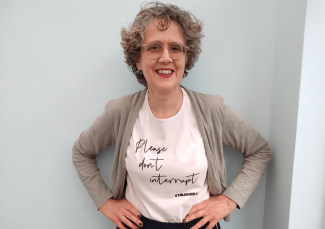I believe wholeheartedly in stammering pride

To celebrate yesterday's International Women's Day, one of our longest-standing and most active volunteers Christine Simpson talks about rising through the ranks in her profession, feminism, starting a group for women who stammer, and what helps her.
I’m Christine. I am a library professional, feminist, STAMMA Trustee, intermittent crafter, lover of theatre, literature and design, and I have a stammer. The point about that first sentence is that I am all those things. Having a stammer isn’t necessarily the most important — although some days it can dominate my thoughts, especially if I have a challenging speech situation.
I am generally outgoing and chatty with a sometimes severe stammer. I have a stubborn streak, (inherited from my maternal grandmother) and sometimes bore everyone witless with causes close to my heart such as STAMMA and feminism. I would say sorry to all my social media followers, but would any man apologise for that? I doubt it.
Working in customer service
My story so far… I spent all my working life in libraries, mostly on the frontline serving customers. I started as a library assistant. Thanks to some far-sighted managers and colleagues I was encouraged to apply for promotion and got it. For some years I was supervising the day-to-day running of the frontline services of six libraries.
Later on I coordinated customer service and complaints for the library service. Complaining library customers were met with my dysfluent speech. This often worked in my favour but sometimes it didn’t. I only ever encountered a few really nasty people. One particularly unpleasant man yelled at me that he wanted to see the manager. I enjoyed telling him, “I am the manager,” which rather took the wind out of his sails. And it helped that my lovely colleagues were at the back of me, cheering silently.
One particularly unpleasant man yelled at me that he wanted to see the manager. I enjoyed telling him, “I am the manager,” which rather took the wind out of his sails.
There were many challenging customers but if you listened to them, however off the wall their ideas might be, you could usually send them away relatively happy. Hopefully I gave them a positive image of stammering.
I combined this with chairing our council’s staff disability network, which was fascinating. I have always felt myself to be part of the disability community and identify as having a disability myself. This is a personal choice, I know many people who stammer have different views and I respect that. Chairing this network gave me experience of mentoring colleagues with different disabilities and supporting them in getting reasonable adjustments at work. So often just a small amount of support at the right time could change people’s experience of work completely. It raised my confidence, going to high level meetings and presenting to the council’s Chief executive.
women's groups
I have been part of STAMMA, and the British Stammering Association (BSA) as it was called, for many years as a volunteer. As a trustee I was involved with all aspects of STAMMA, but as a volunteer my particular interests have been women who stammer (#minoritywithinaminority) and employment issues. Over the years I have participated in and run workshops for women at BSA national conferences and world congresses, leading one workshop with Anita Blom and Pamela Mertz.
Women are a minority in the stammering world, so may feel their issues don’t get raised in mixed groups.
I am the lead admin for the Women Who Stammer Facebook group, a group started by Sheila Denny. It is a diverse group for women who stammer only. We have members from Europe, USA, Africa, India, Australia and New Zealand. We share ideas and experiences about living with a stammer, what helps and what doesn’t.
I often get asked why there aren’t online groups and workshops at conferences for men only. I’m not sure, but women are a minority in the stammering world, so may feel their issues don’t get raised in mixed groups. I also suggest that the person asking might like to start a men-only group. As far as I know, no one has taken me up on it yet. I am happy to advise but I am not the person to run it.
Just recently, Christine Menzies (former Trustee) and I decided to start a self-help group for women who stammer in London (meeting in person rather than just online). We have had four meetings so far and interest is building. I’m hearing other women are interested in starting women-only groups in other parts of the country. A women’s group has now started in Scotland — email info@stammeringscotland.org for more information.
My stammer
I have spent many years trying lots of speech therapy, personal development and counselling. I am happy I have done all this, it has taught me a lot and I hope made me a more accepting person. Indeed, I believe wholeheartedly in acceptance and stammering pride. However, because my stammer can be severe I think I need the support of speech therapy and some techniques to help with the more difficult times. Recently I have found counselling and looking more into the feelings around the moment of stammering very helpful.
That’s what works for me, but one thing I have learnt over the years is there is no one-size-fits-all approach for everyone.
Join the Women Who Stammer Facebook group.
Read more Your Voice articles.
Would you like to write an article? See Submit Something For The Site or email editor@stamma.org for details.

































